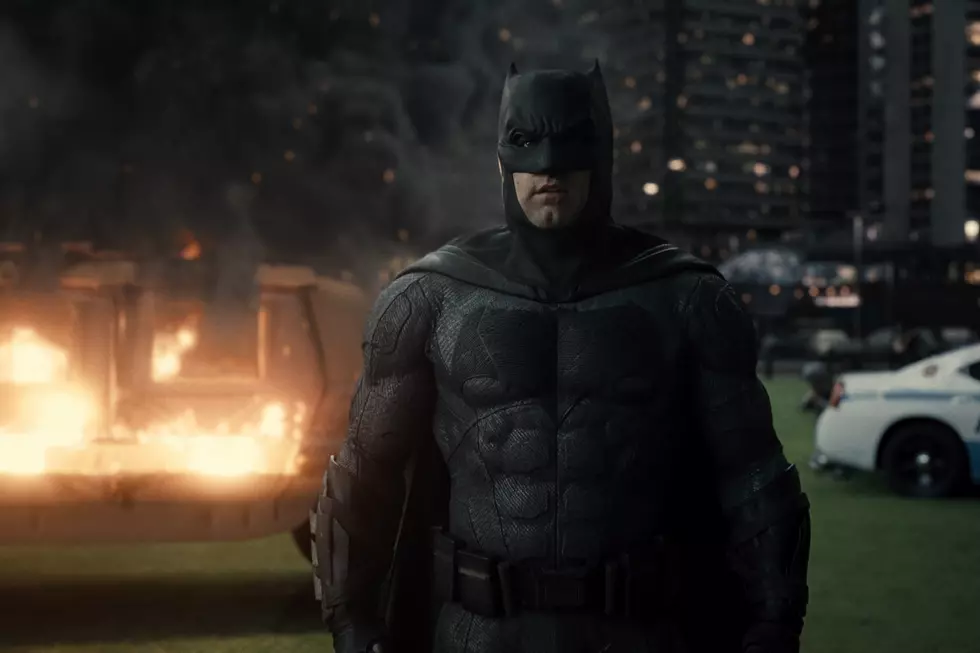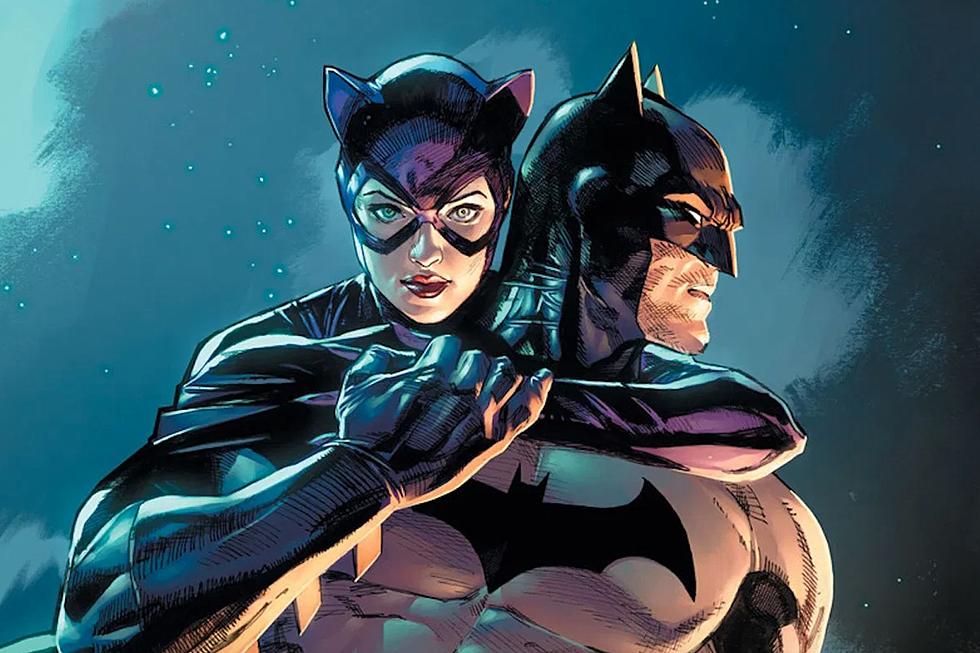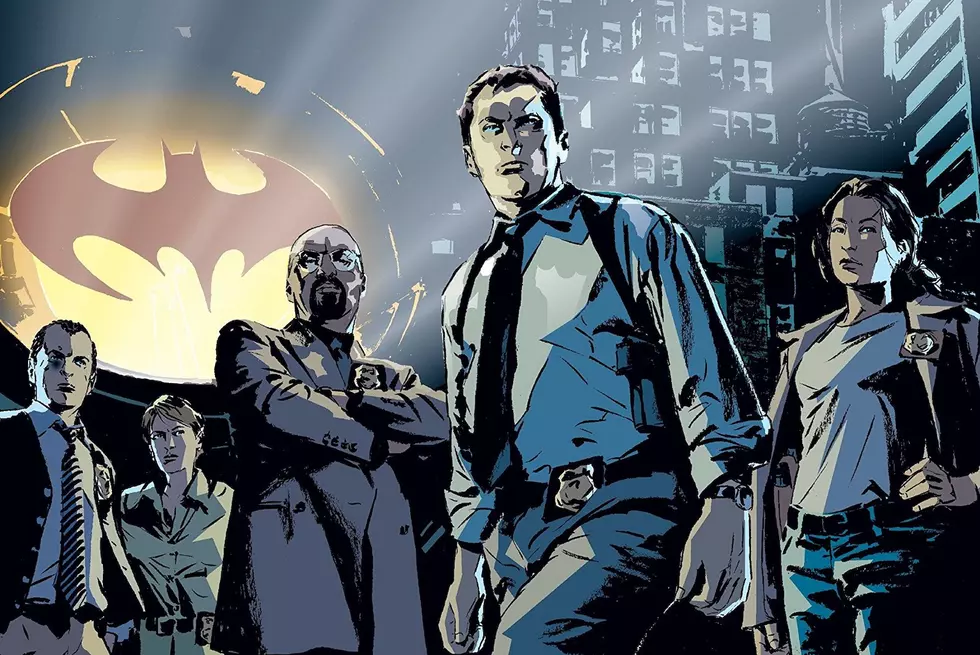![Don’t Draw The Darkness: Scott Snyder On ‘Zero Year: Savage City,’ Part Two [Interview]](http://townsquare.media/site/622/files/2014/08/ZYB01.jpg?w=980&q=75)
Don’t Draw The Darkness: Scott Snyder On ‘Zero Year: Savage City,’ Part Two [Interview]
If there's one thing we've learned from our series of in-depth reviews and interviews about Batman: Zero Year, it's that the creative team of Scott Snyder, Greg Capullo, Danny Miki and FCO Plascencia set out to do a lot more than just re-tell Batman's origin for a modern audience. That might've been the stated goal, but along the way, it became clear that the team wanted to use that bombastic superhero background to tell a story that was incredibly personal, using the trauma that made Bruce Wayne a hero to explore feelings of isolation, fear and, eventually, triumph.
In our final Zero Year interview, Snyder tells us about the interactions with other Batman creators while it was coming out, how he identifies with both Batman and the Riddler, and how much of the story was inspired by his own very personal experiences with overcoming panic and despair.
ComicsAlliance: In our last interview, we talked about how big Year Zero gets. It's a no man's land; the city is destroyed; Poison Ivy's formula is everywhere, making it a jungle; the Riddler has a pit full of lions. But while all that's going on, there are these interstitials with a very tight focus on an aspect of Bruce Wayne's life that we don't usually see. You don't go into the immediate aftermath of the Wayne murders, you don't really go that deep into the training, but you talk about the psychological elements of Bruce trying to live with that trauma. I've always been one of those guys who thinks of him as being Bruce Wayne before the murders and then Batman immediately after, but you go into the trauma and the indecision that comes before he becomes Batman. Why go that route?
Scott Snyder: The Batman that I loved growing up, the thing that Frank Miller did in The Dark Knight Returns, is that he's so vulnerable and mortal in his 50s. That book was the first time I saw Batman as being really layered, human, and suffering, and worried that he wouldn't achieve what he wanted to achieve. Seeing him being obsessed and pathological. The secret to Year One is that it's a Jim Gordon story. It's a great Bruce Wayne story, don't get me wrong, but Jim Gordon is the focus of that book. To me, that's the stronger emotional arc. It's not that the Bruce Wayne stuff isn't masterful, because it is, but it's Jim's book. The beauty of that book is that it makes those characters flawed, especially Jim. He cheats on his wife, he's terrified of being a father, and he thinks to himself that maybe his wife should've had an abortion. All of those things aren't heroic, they're amazingly human.
For Zero Year, it became about -- and I hope it doesn't feel like we were doing it just to change things -- it was about making it as personal as you can make it. Batman, to me, as a kid and to this day, stands as a figure who tells you "be the f*ckin' crazy-ass thing you want to be, no matter what your fears are about that thing." He suffered this incredible trauma as a child, one of the worst things that can happen to a kid. This random, meaningless crime, and he comes back from that trauma and turns himself into this pinnacle -- not just of achievement, but this crazy insane level of transformation. He says, "I am swinging above this city in a cape and mask, I'm a lunatic, but if I can become this amazing thing that defies human logic, you can do what you worry you can't do." It became about that statement, about Batman's meaning to me, articulated on the page.
The stuff about his childhood and the trauma that he faced wasn't to take it away from his core, because I hope it feels true to the core of the character -- how depressed he is and how badly he's suffering from his parent's death. But that's what inspires me about Bruce. As a writer, when you write him longer, you get to know your version of him better and better. That was one of the best things about meeting Grant Morrison.
I'm not going to go off on a huge tangent here, but I talked to him in San Diego when I was starting Zero Year. He was with is wife, and he stood up and came over, he told me he heard I was doing this and he'd read the first issue and liked it, and he asked me how I was doing. I was doing terrible at the time, I was so scared of doing the story. I'd given up American Vampire for a while and I was only doing Batman and Superman Unchained, doing Batman's origin and doing Superman with Jim Lee. It just totally got to me, and I had a terrible series of panic attacks and just fell into a pretty bad place. Just nervous, depressed, constantly worried about whether I was worth anything, calling my friends all the time like, "This is going to be awful, isn't it?" It's happened to me periodically throughout my life.
Grant goes, "How's it going?" and I said, "It's going fine, I appreciate it." And he was just like, "How's it really going?" He understands that it's intimidating. I said, "I'm having a really hard time, man," and he gave me his number and said, "If you ever want to call and talk..." I really appreciated that.
I was telling him about the Batman origin, and he was like, "You know what, all of us have to have a beginning and an end for him. We each have our own birth and death." It was really interesting to hear that. You always think of him as a character in continuity, but as you write him, you make him entirely your own. I knew I was doing the origin and making it personal, but hearing that, I felt like I had a license to make him even more of a vessel for some of the things that he makes me feel I can get past when I'm in a really bad place.
I hope I didn't twist Bruce's childhood years to be too much like when you feel, at least for me, like you're in a really bad place, when everything you see is a reflection of your own failures, fears and weaknesses. It's like a funhouse hall of mirrors. You're not just down about something, everything in the world is telling you that thing is true, even if it has no relation to that thing. If you think like Bruce, "I failed to help my parents, I couldn't stop this thing and nobody helped me," then the world is a place where we're all alone and it's going to happen again because no one's going to be there to stop it when violence erupts out of nowhere. He sees that everywhere he looks.

SS: It's not necessarily as visual as that for me when I'm in a bad place, but you see that. You see, "I'm a failure," or, "It's not worth trying anything." Everything you see, you see someone who's down on their luck on the street, "That's going to be you." You see someone who's doing well, "You'll never be that person because look how different you are from that person." Everything is a reflection or commentary on yourself.
So it became a question of whether I could do [a Batman story] in a way that was personal, but never felt like it was bending the character too much from where he was. That's why I did that, and why it was important to try and really explore his childhood years in a way that made him more vulnerable than you usually see him. For me, it's about taking Batman away from the iterations where he's so much about inspiring fear in criminals, and taking back the city and being this soldier. I love those versions, but for me, the thing that I love about Batman is that he's also a source of tremendous inspiration and defiance and rebellion, getting over your personal fears. Not taking down criminals, but saying, "If he can do that, I can do what I want to do."
CA: Okay, but what did Morrison say about his haircut?
SS: [Laughs] Honestly, I can't say enough about how nice Grant has been about this book. I don't see him frequently, it's not like we hang out, but as someone who came up under him and reveres his work as a writer, the thing that I admire endlessly about his work on Batman and elsewhere is his fearlessness and daring. He'll write a story and he doesn't care what people think, he's clearly following a personal compass. That example, for me, there's nothing that goes above that in terms of trying to emulate certain writers.
Greg Capullo has contributed so much, story-wise, too. It's been a real trip. I had my freakout, like I said, I got really depressed and anxious and totally insecure for the first couple months, and all I could do was really stick to my outline. Greg was such a good friend, he has that way like a coach, he has that wrestler quality. "You're gonna kill it, man! You're gonna rock out on this thing! It's gonna be amazing! I don't wanna hear it!" But he was also really sweet, just a great friend. He'd call and check in on me and we'd talk back and forth, but he had a lot of insecurities too. He got paralyzed sometimes, intimidated by the fact that he was doing the origin.
I hope what's clear is that we gave everything we had, all of us on the team. There wasn't anything that doesn't work about it that comes from lack of trying. We gave it all we had, to the point that when we were done with it, honestly, we all needed a break, which we took. It was so grueling to be dealing with material that was so important to all of us, but to also do a story that was so long, and big, and oversized and bombastic. Greg is the kind of artist who's like, "Can you throw me some lobs? Like some scenes that are in the dark so I can get ahead?" He was always ahead, but he wanted more, so there are those scenes in the elevator shaft in "Savage City," and he draws every gear.
I was like, "Dude, that was the lob." He's such a perfectionist, he doesn't like to hide anything or use any tricks. Finally, when we got to the page where he gets to the Sphinx room, I was like, "Greg, this page is f**king black. It's black. Take a break." There's a few slender panels of him saying, "Am I right?" but that's it. "Please, don't draw the darkness."

CA: This is a loaded question, and I already know the answer: Do you identify with the Bruce Wayne that we see in "Savage City?"
SS: Oh, sure. It's deeply personal. When he says, "I want you to shock me until I'm someone else," it's extremely personal. I identify with him tremendously. You have to. That's the thing about Batman. I can't impress upon anyone reading this enough how scary it is to write Batman if you love that character, because some of the greatest stories in all of f*cking literature, not just comics, have been done with that character. My kid is going through a phase where he loves Batman: The Animated Series. He watches it all the time.
CA: Yeah, that phase is going to last at least 30 years.
SS: That's my hope. I'm like, "Let's watch this one again!" I don't want to use them all up. But literally, tonight, he watched "Joker's Millions," and he rates them to himself. It's so funny. This morning we watched "Sins of the Father," the Tim Drake origin, and "Night of the Ninja." I was the same way as a kid, running home to watch Batman '66, because you don't realize it's funny or campy. Or to be in high school and college watching B:TAS, because it was so immersive and kept you interested, and then on to Grant's stuff.
In terms of identifying with Bruce and that stuff, it's the only way to do it. The only way to write Batman, if you get the chance -- and I hope everyone out there gets the chance -- is to imagine you made him up. And that's what Grant did, I promise you, by saying "I have a birth and a death for Batman." Grant's Batman is his creator-owned character. Frank Miller's Batman is Frank Miller's creator-owned Batman. It bears little relation to Grant's Batman, which bears little relation to my Batman. They coexist, and it's great that they can coexist, but until you write him like you made him up, and you have your own origin and your own death, even if you accept the origin from someone else's book, with your version's obsessions and vulnerabilities, you're going to be intimidated. You're always going to be writing him like it's derivative from someone else.
That was a huge lesson to learn for me. Writing Court of Owls, I was trying to write something that was Grant's Batman or Frank's Batman, and you can probably see me on that book realizing that i could make him my own going forward, but that was the trumpet thing of it. I'm going to make it as personal as I can, and hopefully because I'm not trying to turn him into a cypher for myself and my own feelings about what it's like to go through something dark and feeling like you found something to help you go through it, but because Batman was always a part of that for me, and Batman is always a character that I relate to because that's what he stands for, that no matter how personal it got, it would feel true. That's what you have to trust, I think, if you ever get the chance to write Batman or any other iconic character.
If you love the character, you can make it as personal as you want, because it'll still be an honest representation of that character... not too far off the mark. Your love of the character is one of the reasons you stuck with them through the kinds of things you're talking about in your own life.

CA: The reason I asked that is that I'm also wondering how much you identify with the Riddler.
SS: [Laughs]
CA: You're a guy who -- and this is evident for anyone who has read your comics -- a guy who loves trivia. You love etymologies and minutiae and riddles. You're the one stetting up these problems, and as much as Batman is an aspirational figure, you, the writer, are the villain. You're the one putting him through this and creating the problems. I know we've talked before about how much you like the Riddler, but he's kind of the perfect character for your style of writing. You want to give Batman these intensely brainy, metaphorical situations -- the very idea that Riddler literally ties Gotham City to his heartbeat and forces Batman to reboot the city by tying it to his own heart, that's a very writery thing to do.
SS: You're absolutely right. He allows me to go the places that I like to go that way, too. Some places I don't like to go, as well. I thought he'd be a lot easier to write than he was. I remember Paul Dini, when we were together on a panel, someone asked him about the Riddler and he said, "Riddler's great, until you get to those damn riddles.' I was like "Ah, it's not gonna be a big deal." Then I got to the Riddles and they were horribly hard.
You're always like, "I know a riddle! Why was six afraid of seven? Because seven-eight-nine!" or whatever. You can imagine Batman being like, "Damn it, I didn't think of that!" but that's not gonna work.
CA: Batman has to solve the gruesome murder of the number nine.
SS: I called in a lot of help, to be honest. I called a lot of freinds. "I need a riddle that relates to the Gordian Knot, or lions and bees," and so there were many, many friends that helped with those. I reserved a couple of days just for those riddles, and I left them out 'til the end. I knew what they were about, I knew what the answers were, I know what it has to be, but yeah.
In terms of Edward in general, he's a wonderful character to write. For me, he's so deluded, and I definitely feel like I can relate to his denial about himself, as a writer. I hadn't thought about it before you asked, but it's true: You have certain things that you want to get in there because you researched them. You want to be like "I looked this up and it's a cool fact! This pertains to this symbolically!" but there's no room.
With Joker, that was one of the hardest things. I did a lot of research about jesters and Peter Pan and Frankenstein, just a lot of elements that I meant to be symbolic underpinnings of that story, but the Joker doesn't fit the character of someone who would expound on things or show them off. He likes to make sadistic, terrifying humorous comments about them, but he's not going to give you a history lesson on them. Riddler's great for that. He's like "Let me tell you about the African bat myths!" and turns it into a trap.
There's an element of ego to writing the Riddler. You research a lot of things that you end up jettisoning as a writer, and Riddler was a lot of fun to get to have that sort of annoying know-it-all personality lording over the city. He's a lot of fun to write about.
One of the things I didn't get to, which I wish I could've teased out more, and this would've made the story even longer, was that we were going to have backups in the whole thing. The second part would've showed Riddler's history, his childhood and how he became who he became. Part of that was to draw a parallel between him and Bruce, as someone who overcame a trauma to become who he was, and how Riddler went the other way. So he means a lot to me as a character, and there's a lot that I didn't get to explore that I hope to at some point. He's tremendously fun.
CA: I look forward to seeing you at New York Comic-Con in a neon green suit.
SS: If I was in better shape.
CA: You work out! No excuses.
SS: Yeah, but... I'm a dad, dude. It kills you.
More From ComicsAlliance









